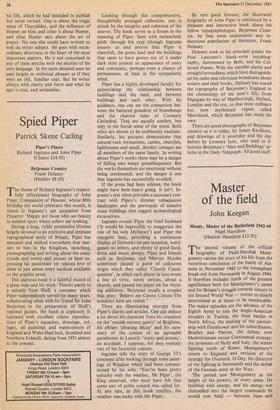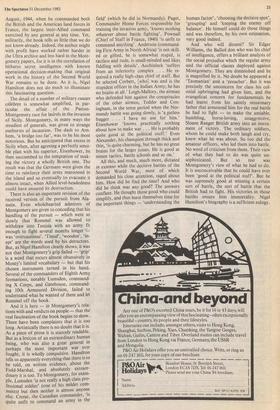Master of the field
John Keegan
Monty, Master of the Battlefield 1942-44 Nigel Hamilton (Hamish Hamilton £12.95)
he second volume of the official 1 biography of Field-Marshal Mont- gomery carries the story of his life from the victorious conclusion of the battle of Ala- mein in November 1942 to the triumphant break-out from Normandy in August 1944. It therefore includes much of the greatest significance both for Montgomery's career and for Britain's struggle towards victory in the Second World War — stories so closely intertwined as at times to be inextricable. The major episodes are the advance of the Eighth Army to join the Anglo-American invaders in Tunisia, the final battles in North Africa, the making of the partner- ship with Eisenhower and his subordinates, Bradley and Patton, the debate over Mediterranean versus Continental strategy, the invasions of Sicily and Italy, the winter fighting south of Rome, Montgomery's return to England and revision of the strategy for Overlord, D-Day, his direction of the fighting in Normandy and the defeat of the German army in the West.
The period saw Montgomery at the height of his powers, in every sense. He bubbled with energy, and his energy was channelled into the largest commands he would ever hold — between June and
August, 1944, when he commanded both the British and the American land forces in France, the largest inter-Allied command exercised by any general at any time. Yet, militarily, the book tells us little that we do not know already. Indeed, the author might with profit have worked rather harder in the Ultra archive and less hard in the Mont- gomery papers, for it is in the correlation of hitherto secret intelligence with known operational decision-making that original work in the history of the Second World War remains to be done. As it is, Nigel Hamilton does not do much to illuminate this fascinating question.
The detail of a number of military causes celebres is somewhat amplified, in par- ticular the affair of the Patton- Montgomery race for latirels in the invasion of Sicily. Montgomery, in many ways the steadiest of generals, was given to strange outbursts of incaution. The dash to Arn- hem, 'a bridge too far', was to be his most notorious. But he anticipated that excess in Sicily when, after agreeing a perfectly sensi- ble plan with his superior, Eisenhower, he then succumbed to the temptation of mak- ing the victory a wholly British one. The result was that the Germans were given the time to reinforce their army marooned in the island and so eventually to evacuate it almost intact, when Allied level-headedness could have ensured its destruction.
There is also an important revision of the received version of the pursuit from Ala- mein. Even wholehearted admirers of Montgomery are given to conceding that his handling of the pursuit — which went so slowly that Rommel was allowed to withdraw into Tunisia with an army fit enough to fight several months longer =— was 'overcautious'. 'Timid', 'wooden', 'in- ept' are the words used by his detractors. But, as Nigel Hamilton clearly shows, it was not that Montgomery's grip failed — 'grip' is a word that recurs almost obsessively in Monty's limited vocabulary — but that his chosen instrument turned in his hand. Several of the commanders of Eighth Army formations, notably Lumsden, command- ing X Corps, and Gatehouse, command- ing 10th Armoured Division, failed to understand what he wanted of them and let Rommel off the hook.
And it is here — in Montgomery's rela- tions with and verdicts on people — that the real fascination of the book begins to show. There have been complaints that it is too long. Artistically there is no doubt that it is.
As a piece of prose it is scarcely readable. But as a lexicon of an extraordinary human being, who was also a great general in perhaps the most important war ever fought, it is wholly compulsive. Hamilton tells us apparently everything that there is to be told, on written evidence, about the Field-Marshal, and absolutely extraor- dinary it is too. To Montgomery, for exam- ple, Lumsden 'is not really a high class pro- fessional soldier' (one of his milder com- ments) but then neither is almost anyone else. Crerar, the Canadian commander, 'is quite unfit to command an army in the
field' (which he did in Normandy). Paget, Commander Home Forces responsible for training the invasion army, 'knows nothing whatever about battle fighting'. Pownall (Chief of Staff in France, 1940) 'is unfit to command anything'. Anderson (command- ing First Army in North Africa) 'is not skill- ed or gifted, he is somewhat stupid, is tactless and rude, is small-minded and likes fiddling with details'. Auchinleck 'suffers from an inferiority complex . . . He re- quired a really high-class chief of staff. But he selected Corbett, [who] was and is the stupidest officer in the Indian Army; he has no brains at all.' Leigh-Mallory, the airman who defended him against the conspiracies of the other airmen, Tedder and Con- ingham, in the tense period when the Nor- mandy battle was going slowly, is 'a gutless bugger . . . I have no use for him.' Eisenhower 'knows practically nothing about how to make war . . . He is probably quite good at the political stuff.' Even Alexander, his champion through thick and thin, 'is quite charming, but he has no great brains for the larger issues. He is good at minor tactics, battle schools and so on.'
All this, and much, much more, dictated in extenso while the decisive battles of the Second World War, most of which demanded his close attention, raged about him. How did he find the time? And who did he think was any good? The answers conflate. He thought those good who could simplify, and thus leave themselves time for the important things — 'understanding the
human factor', 'choosing the decisive spot', 'grouping' and 'keeping the enemy off balance'. He himself could do those things and was therefore, by his own estimation, very good indeed.
And who will dissent? Sir Edgar Williams, the Balliol don who was his chief of intelligence, offers a brilliant analysis of the social prejudice which the regular army and the official classes deployed against Montgomery. They are diminished and he is magnified by it. No doubt he appeared a 'Tasmanian' and a 'preacher'. But it was precisely the unconcern for class his col- onial upbringing had given him, and the evangelical concern for fundamentals he had learnt from his saintly missionary father that armoured him for the real battle he had to fight — to make the amiable, bumbling, horse-loving, unaggressive, Sloane Ranger British army into an instru- ment of victory. The ordinary soldiers, whom he could make both laugh and cry, knew what he was about. So too did the amateur officers, who led them into battle. No word of criticism from them. Their view of what they had to do was quite un- sophisticated. But so too was Montgomery's view of what he had to do. It is unconceivable that he could have ever been 'good at the political stuff'. But he was supremely good at winning a certain sort of battle, the sort of battle that the British had to fight. His victories in those battles ensure him immortality. Nigel Hamilton's biography is a sufficient eulogy.















































 Previous page
Previous page